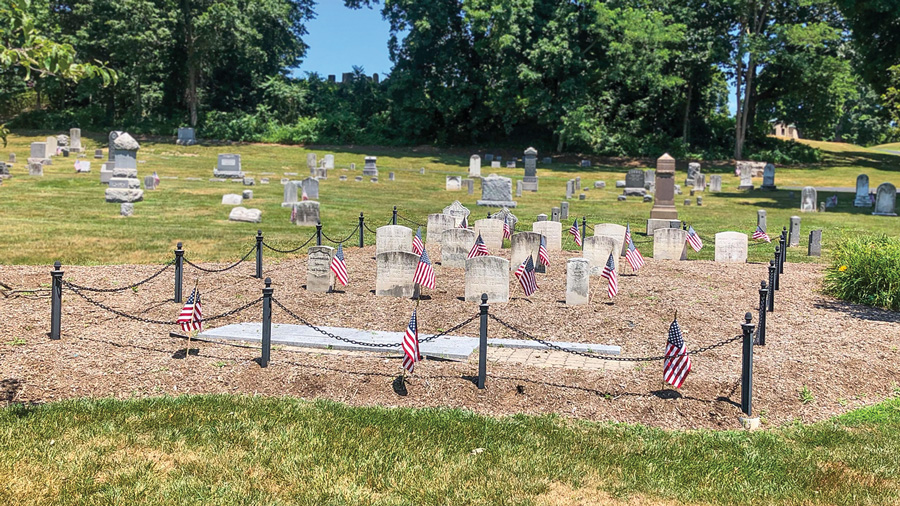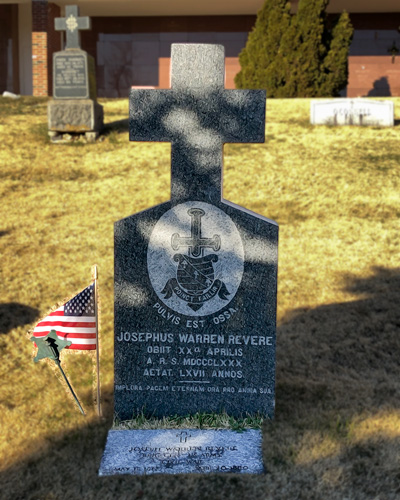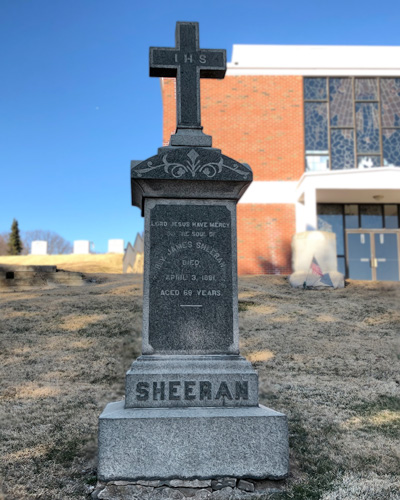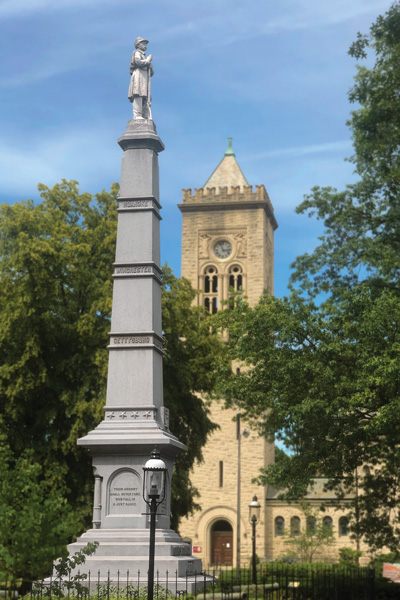Though better known for its role in the Revolutionary War, Morristown has a surprisingly rich connection with America’s “Second Revolution,” the Civil War. After the Confederate bombardment of Fort Sumter and the defeat of the Union Army at the First Battle of Bull Run, the call for enlistments went out in the North, and Morristown proudly answered, raising over 100 local volunteers to form Company K of the 7th New Jersey Regiment. The regiment’s commander was Joseph Warren Revere, grandson of Paul Revere, who was already a well-known naval officer and the architect and owner of the Willows Mansion at Fosterfields Farm in Morristown. Company K would receive a grand send-off on the Morristown Green, with services at the Presbyterian Church before joining the 7th NJ and their sister regiments to form the 2nd New Jersey Brigade which fought on some of the bloodiest battlefields in this country’s history, from the Peninsular Campaign through Gettysburg all the way to Robert E. Lee’s surrender at Appomattox Court House.

In all, more than six thousand men from Morris County served in the Union Army, including Captain Ira J. Lindsley of the 15th NJ Regiment, a member of the prominent Lindsley family who were some of the first settlers in what would become Morristown. Captain Lindsley, like so many, paid the ultimate sacrifice when he lost his life on May 3, 1863 at Chancellorsville where his body was never recovered. Though physically lost, his actions were enshrined when after the war Morristown’s post of the Grand Army of the Republic (GAR, the Civil War’s version of an American Legion veteran’s organization) decided to name themselves in honor of Lindsley, their fallen comrade and neighbor, instead of the more prominent Major General Phil Sheridan.


While Captain Lindsley’s life ended at Chancellorsville, so did General Joseph Warren Revere’s military career, when after the Union’s embarrassing defeat, part of the blame was assigned to him, resulting in a court-martial. Although Abraham Lincoln himself threw out the charge, Revere left the army and returned to Morristown, where he wrote two autobiographies before passing away on April 21, 1880, being buried at Holy Rood Cemetery. A stone’s throw away from Revere’s final resting place is the grave of Father James B. Sheeran, a pastor of Morristown’s Assumption Church, as well as a former chaplain of the Confederate Army. During his service preaching the word of God for the Southern cause, Sheeran once famously told Stonewall Jackson that “as a priest of God I outrank every officer in your command, I outrank even you.”
Morristown may be the only town that can claim not one, but two court-martialed generals as residents. Like Revere, Major General Fitzjohn Porter was faulted and discharged from the army for a humiliating Union defeat, this one at the Second Battle of Bull Run. After the war Porter made his home at 1 Farragut Place, (which itself is named after another Civil War hero, Admiral David Farragut.) The two mistreated generals became good friends after the war, and Porter was a pallbearer at Revere’s funeral. Porter was later vindicated in 1886 when his trial was ruled unjustified. He was restored to the army at the rank of a colonel before voluntarily retiring and would go on to serve as the Police Commissioner and Fire Commissioner of New York City.
Other high-ranking lives came together in post-war Morristown. Major General George Sears Greene and Brigadier General Hannibal Day, West Point graduates from the Class of 1823, served with the Union Army where they both saw action at Gettysburg. Day led a brigade of US Regulars around the Wheatfield while Greene led his brigade of New Yorkers in the defense of Culp’s Hill against an entire Confederate division, an action many would credit with saving the entire Army of the Potomac. After the war, Day’s son would marry Greene’s daughter, and later on after the death of Day’s son, they would both move in with Greene’s widowed daughter at 15 Wetmore Avenue.

The Morris County Civil War Monument stands proudly on the Morristown Green, where Company K was given their farewells the before marching to war. The forty-eight-foot, one-hundred-ton tower with its silent sentinel watching over the town was unveiled on July 4, 1871. With attendance reportedly at a thousand spectators, Secretary of the Navy George M. Robeson gave the keynote address, with Governor Theodore Randolph and Fitzjohn Porter beside him. President Ulysses S. Grant and Major General George B. McClellan, a future governor of the state, sent letters to be read to the public for the event.
Ulysses S. Grant may have missed the monument’s dedication, but he was no stranger to Morristown, visiting on multiple occasions due to his friendship with resident and famed political cartoonist Thomas Nast, whose house still stands at 45 Macculloch Avenue. On one of his visits Grant signed the guest book of the Market Street Fire House. Grant’s son was also a resident of Morristown, owning property near Peck School, and Grant’s younger brother, Orville Lynch, was committed to Greystone Park Psychiatric Hospital in the late 1870s. Other famed Civil War figures who passed through Morristown include Frederick Douglas, who gave a speech on the Green on June 9, 1865, and Major General Abner Doubleday, better known for being the father of baseball, who spent time here while living at the Phoenix House in Mendham.
There are hundreds of Civil War veterans buried throughout this town’s cemeteries in addition to the aforementioned Holy Rood. At Evergreen Cemetery on Martin Luther King Avenue you will find the grave of George T. Cobb who before becoming the first mayor of Morristown, fought as a US Congressman in support of the war effort and later died in a train accident in 1870 while on a tour of that war’s battlefields. Moving to Morristown after losing his left foot at the Battle of Spotsylvania Court House, Brigadier General Henry Harrison Walker may be the highest-ranking Confederate buried in New Jersey, where he spent his postwar life as a successful stockbroker. Down the hill from this Virginian rebel are the graves of fourteen United States Colored Troops, all men who fought against Walker’s Confederacy to help win the freedom of four million slaves and ended up in their postwar years in Morristown, New Jersey.